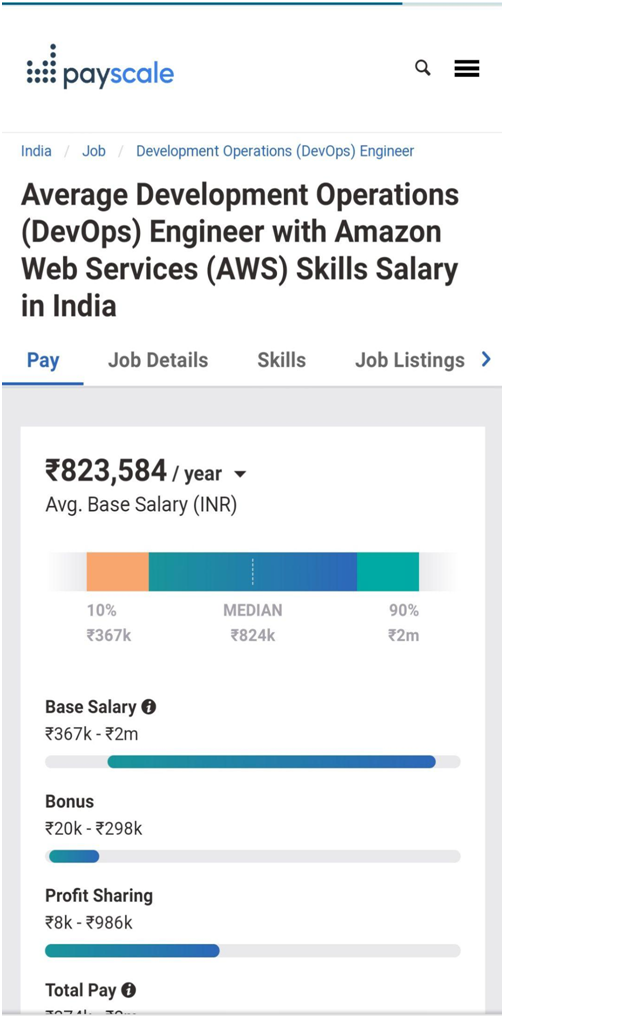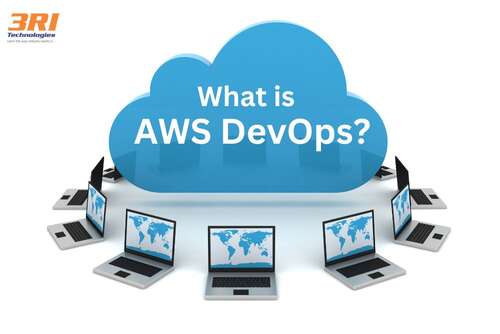Technology changes quickly and will only get better as time goes on. The last 20 years have seen much more change in this field than in the past. Two crucial technologies in the well-known IT discipline of cloud computing are AWS and DevOps. This blog talks about how these two technologies work well together. Keep reading to learn about all AWS DevOps, such as what AWS DevOps is, AWS DevOps jobs, AWS DevOps jobs for freshers, and so on?
Curious to know what is AWS DevOps and why it’s in high demand? AWS DevOps integrates cloud services with DevOps practices to streamline software delivery, enhance scalability, and boost automation. Whether you’re exploring DevOps for AWS, aiming to become an AWS DevOps engineer, or considering an AWS certification for DevOps, mastering DevOps with AWS opens doors to future-proof career paths. At 3RI Technologies, our hands-on Aws Devops Courses guide you through everything from fundamentals to deployment pipelines—equipping you for real-world roles in cloud and automation.
Mastering DevOps in AWS: Meaning, Tools, and AWS DevOps Certification
DevOps is a combination of the fields of development and operations.It includes several ideas, practices, technologies, and tools that help companies improve how quickly they can offer new services and applications with better products. Before, this speed was hard to achieve with traditional ways of managing infrastructure and making software. DevOps brings the two departments together so customers can get software faster, more accurately, and more quickly.
System Administrators in companies who know how to code are AWS DevOps Engineers. They are in charge of the following tasks for an organization:
- Planning of applications and infrastructure
- Developing and maintaining CI/CD pipelines
- Keeping an eye on growth security
- Automating the process of development
Interested to begin a career in DevOps? Enroll now for DevOps Training in Pune

What Exactly Is AWS?
Cloud computing has grown significantly over time.There are various cloud services providers, such as Microsoft Azure, Google Cloud, Amazon AWS, and IBM Cloud Services.Amazon Web Services (AWS) is a cloud computing platform developed by one of the world’s largest companies, Amazon. It contains numerous features, services, and solutions that assist with data storage, access, and alteration. AWS and other cloud service providers make storing a lot of company data online rather than on-site simple and secure. Also, that makes a lot of space.
Now that you know the two fields, let’s figure out what is AWS DevOps.

What Exactly is AWS DevOps?
AWS DevOps is a technology developed so businesses may leverage the capabilities, tools, and services of this cloud platform to implement the principles of DevOps. Companies may leverage various flexible services to build and deliver their products more rapidly and reliably with AWS and DevOps. Several business operations, such as monitoring applications, managing infrastructure, automating software release processes, deploying application code, etc., are made simpler by the characteristics of AWS DevOps.
Thanks to this technology, organizations can carry out continuous integration and delivery (CI/CD) activities. It allows them to automatically build, deploy, and test the applications in AWS or on-premises settings while storing the source code for the applications and keeping track of their versions.
AWS DevOps is, as noted previously, a subfield of Cloud Computing. The three fundamental Cloud Computing components are:
- Platform as a Service (PaaS)
- Software as a Service (SaaS)
- Infrastructure as a Service (IaaS)
After receiving an introduction and understanding what is AWS DevOPS, let’s continue our education by examining the architecture of AWS DevOps.
Interested to begin a career in AWS? Enroll now for AWS Training in Pune.
What Exactly is An AWS DevOps Engineer?
An AWS DevOps engineer is a professional who manages and automates the deployment of technology, services, and apps on the Amazon Web Services (AWS) platform. They make and keep up cloud-based systems that work well, are stable, and can grow as needed by using a mix of development, operations, and automation skills.
One of an AWS DevOps professional’s jobs could be to design and build infrastructure as code (IaC) solutions using tools like AWS CloudFormation and AWS Terraform to automate code deployment and continuous integration and delivery (CI/CD) pipelines using tools like AWS CodePipeline and AWS CodeDeploy; and to make sure that systems are always available and can handle errors using AWS services like AWS Elastic Load Balancer, Amazon CloudWatch, and AWS Auto Scalin.
You need to know a lot about AWS services and architecture, computer languages like Python and shell scripting, DevOps tools and technologies, and how to communicate and solve problems well in order to become an AWS DevOps developer. AWS has certificates, like AWS certified developers, that can help prove these skills and improve a person’s chances of getting a job as an AWS DevOps Engineer.
Architecture of AWS DevOps
If you wish to know everything about AWS DevOps, it is essential to comprehend its architecture. Today, we’ll dissect each component of Amazon DevOps to illustrate how each technology is utilized.
● Load Balancing –It is a scalable virtual network appliance that allows enterprises to spread traffic from Amazon Elastic Compute Cloud (EC2) across several web serversThis may be accomplished automatically using AWS ELB (Elastic Load Balancing).
● Amazon Security Group – Security has become crucial as hackers gain access to an increasing amount of commercial data and other private and personal information. Amazon security groups secure a company’s data by acting as network barriers. Users must determine the allowed ports, protocols, source IP ranges, etc., to access EC2. All users can allocate a single EC2 instance to several security groups, directing authorised traffic to the correct instances.
● Amazon CloudFront – Amazon CloudFront delivers websites that change, websites that don’t change, websites that stream, and other content. It’s easy to use with other cloud platforms and can also be tweaked to work well with other AWS parts.
● ElastiCache – It helps to keep track of the cloud’s memory cache. This web service stores data that is used often. This simplifies businesses’ utilise services and increases their scalability and speed.
Enroll in our AWS Online Training today!
● Amazon’s Simple Storage Service (S3) –Data and other assets used in online applications can be accessed, backed up, and stored using Amazon’s AWS S3 service. Amazon S3 provides an intuitive interface that enables you to handle massive volumes of data via the Internet as needed. The information can be saved as objects in buckets, which can then be read, updated, changed, and modified as required.
● Amazon Relational Database Services (RDS) – Amazon’s RDS service makes it easier to set up, scale, and run a cloud-based relational database, among other things. This service helps with the day-to-day tasks and functions of managing a database. It also gives you ways to work with cost-effective and scalable RDS. Currently, RDS works with databases like Microsoft SQL Server, Oracle, MariaDB, Amazon Aurora, etc.
● Amazon Elastic Block Store (EBS) – The Amazon Elastic Block Store (EBS) allows users to manage data partitions and application logs.Moreover, it allows rapid accessibility and long-term persistence. EBS volumes work best when combined with primary storage for file systems, databases, and other applications that need access to unformatted, raw updates.
● Amazon Auto-Scaling – AWS Auto-Scaling puts together groups of servers that users can shrink or grow depending on their needs.
It is the time to comprehend the responsibilities and duties of aws-certified DevOps Engineers within a company.
Update your skills with DevOps With AWS Training
Why Should You Utilize AWS DevOps?
AWS’s DevOps services are essential because they help teams create high-quality apps more quickly and with better security, reliability, and scalability. By automating the creation and deployment process, teams can spend their time on new ideas and making their apps better instead of doing things by hand.
- Effective Deployment
AWS helps to simplify the deployment process, which cuts down on mistakes and saves time. It lets developers deploy their code more quickly and often so they can focus on improving their apps instead of doing manual deployment tasks.
2. Continuous Integration and Continuous Delivery (CI/CD)
AWS and DevOps offer a group of services and tools that help teams set up a CI/CD workflow. This pipeline tests and deploys changes to code automatically. In this way, developers can give people new updates and features more quickly and reliably.
3. High Scalability
With AWS DevOps, developers can create and set up systems that are very scalable and can handle a lot of traffic and sudden demand spikes. This makes sure that apps work well no matter what and meet users’ wants and expectations.
4. Ideal Security
AWS Identity and Access Management (IAM) and AWS Security Hub are two security tools that come with AWS cloud DevOps that can help teams keep their apps and data safe. Teams can find and fix flaws early in the lifecycle by using DevOps as part of the development process.
5. Cost Reduction
AWS can help teams save money by automating infrastructure setting up and scaling. This can cut down on the time and resources needed to handle infrastructure. In the long run, this can save you a lot of money.
AWS Certified DevOps Engineers
You will have a variety of tasks and responsibilities in a corporation as a skilled AWS DevOps Engineer. Here are some of them:
- Set up, automate, manage, and keep the AWS cloud-based system running.
- Ensure that AWS production systems are fast, scalable, available, and safe.
- Take care of making, deploying, and setting up the systems.
- Compare the new technologies and vendor products to other options.
- Troubleshoot the systems and fix problems on various platforms and applications.
How to Become More Known About AWS and DevOps
Those who are interested in pursuing a career in the field of AWS DevOps and learning more about it are required to follow the steps that are listed below:
- Learn about AWS and DevOps services.
- Learn the key ideas behind AWS and DevOps.
- Discover how to utilize the many AWS DevOps tools and technologies.
- Gain real-world experience in this field by working on projects.
- Enroll in the top course to pass the exam. Professional AWS Certified DevOps Engineer
Among the many excellent online AWS DevOps certifications, 3RI Technologies stands out. With the help of this training program, you can become a qualified professional in this lucrative area. Gain practical experience in your field while you work on projects relevant to your field of study here. Plus, you’ll pick up both the fundamentals and the advanced knowledge you need to get a good career in the area. Your resume will get a significant boost when you seek jobs thanks to the industry-recognized course completion certificate you’ll receive upon finishing the course.
AWS DevOps Tools
AWS DevOps gives you several tools to help you build cloud software. Look at some of the most well-known and widely utilised AWS DevOps tools.
- AWS CodeStar –Amazon CodeStar is a useful tool for implementing DevOps on the AWS platform. It has an easy-to-use, interactive interface that makes it easy for users to develop and deploy their apps on AWS. Additionally, it enables users to quickly set up the entire chain of tools for continuous delivery.This is the finest tool to use to focus on operating AWS. It’s like having everything you need in one place to manage the entire life cycle of a software product.
- AWS CodePipeline – This tool enables the automation of continuous-delivery program codes to obtain timely and correct updates. This helps improve things like building, testing, and deploying applications.
- AWS CodeBuild –AWS CodeBuild is a completely managed service that allows professionals to compile the source code of a programme, test the application, and create a deployable software package. It enables users to write and test programs through scaling indefinitely.
- AWS CodeDeploy – By automating the process, AWS CodeDeploy makes it simple to distribute software to local environments or cloud services such as AWS Lambda, AWS Fargate, Amazon EC2, etc.This tool keeps the system from going down while it’s being set up.
- AWS Cloud Development Kit –A platform for developing open-source software is known as the AWS Cloud Development Kit. It uses well-known programming languages to represent and deliver the resources for cloud applications.
Want to Upskill to get ahead in your career? Check out the DevOps Online Training
Best Practices for AWS DevOps
Here, you’ll discover the AWS DevOps best practices and use cases businesses find most appealing.
- Continuous Integration/Continuous Delivery – The DevOps philosophy is based on CI/CD pipelines.Continuous integration is regularly developing and testing a project by making code modifications at predetermined intervals. Continuous delivery builds on CI by putting code into the production environment automatically.
- Infrastructure Automation – This best practice emphasizes code quality and the necessity to test it at regular intervals routinely.
- Infrastructure as Code – By creating a machine- and human-readable template file, this procedure manages and provisions your AWS cloud resources. The go-to tool for AWS cloud development clients is the AWS CloudFormation tool.
- Monitoring and Logging – All system activity must be monitored and logged to ensure that events are triggered appropriately and to identify and resolve any performance issues.
- Communication and Collaboration – The project must be communicated to and supported by every team and department.Also, there must be a platform for sharing constructive criticism that can influence the project’s direction.
Master the Azure DevOps Skills at DevOps and AWS Package Training
Pros of AWS DevOps
Here, you will learn about the advantages of employing AWS for DevOps.
1.Promotes Cooperation
DevOps strives to deliver services that facilitate communication and collaboration across many departments. AWS is useful for facilitating inter-organizational communication.DevOps team members can define access levels, rights, and policies for various project stakeholders using Amazon capabilities like access and identity management.In addition, AWS enables clients to view and share DevOps progress in real time over a secure network environment.
2. Process Automation
AWS CodeDeploy can enable a DevOps professionals to automate certain processes, which is one of their primary responsibilities. This Amazon service allows enterprises to automate manual deployment and testing processesAlso, the management and automation of several tasks and the compilation of reports on accomplishing desired results are provided via Amazon Management Console and AWS Command Line Interface (CLI). AWS also reduces the need for businesses to set up and construct infrastructure by performing these tasks automatically.
3. Simple to Work With
For businesses to utilize Amazon services, they must have an AWS account.Also, they must install the programme to get the needed services. The scalability of Amazon makes it easy for a company’s DevOps department to handle several instances.This unique part of DevOps lets companies quickly distribute the resources they need for the app and cloud projects. AWS also helps with allocating resources and gives users an interactive experience.
How Do You Study AWS DevOps?
If you want to learn about AWS DevOps and work in this field, you must do the following:
- Develop expertise in AWS and DevOps services.
- Learn the fundamental AWS and DevOps principles.
- Master the many Amazon DevOps tools and technologies.
- Get practical experience in this subject via projects.
- Enroll in the finest course to pass the exam. Professional AWS Certified DevOps Engineer
3RI Technologies provides one of the best AWS DevOps certifications available online. You can become certified in this well-paying profession with the aid of this training programme. In addition, you will participate in industry-based initiatives to gain practical experience.Also, you will learn all the essential and advanced skills required to land a job. You will also receive an industry-recognized certificate of course completion upon completion, which will significantly enhance the value of your resume when applying for jobs.
Now it’s time to discuss AWS DevOps engineer jobs.
Jobs and Salaries for AWS DevOps
Professionals and organizations are still talking about IoT, the Cloud, AI, etc., but AWS DevOps has become a new topic of conversation. Even though it has been around for a long time in different forms, more organizations worldwide are now using it. Employers like Oracle, Barclays, Tech Mahindra, and Accenture constantly seek individuals with AWS DevOps expertise.
More and more companies, as a mainstream strategy, are also thinking of AWS DevOps.So, this field has the potential to offer numerous excellent employment prospects. Let’s take a look at some facts and numbers that show this:
- According to Glassdoor, an Indian Senior DevOps Engineer makes an average pay of around Rs. 12,000,000.
- In India, a first-year Amazon DevOps Engineer pays an average of Rs. 6,000,000.
- Glassdoor says there are about 12,505 DevOps Engineer jobs in the United States.
According to Payscale, the average income of an AWS-certified DevOps Engineer in India is $823,524 per year.

Azure DevOps vs AWS DevOps
Azure DevOps and AWS DevOps are two well-known cloud-based DevOps platforms that provide a range of tools and services to help the development and deployment of applications. Here are a few significant differences between the two
- Cloud Service Provider
AWS DevOps is an Amazon Web Services product, whereas Azure DevOps is a Microsoft product.
2. Integration
Both platforms have extensive integrations with third-party tools and services; however, AWS with DevOps has closer integrations with AWS services, while Azure DevOps has deeper integrations with Microsoft tools and services.
3. Services Provided
These kinds of platforms provide source control, testing, deployment, continuous integration and delivery (CI/CD), and other DevOps capabilities. AWS DevOps delivers a greater range of services, such as infrastructure management and deployment, whereas Azure DevOps primarily concentrates on software development and delivery.
4.The Learning Curve
Both platforms need some training and knowledge to work well, but Azure DevOps is thought to be easier for most people to use. On the other hand, AWS services for DevOps can be challenging to understand because they offer more services and features.
5. Pricing
Although both platforms have various price options, AWS DevOps can be more costly due to its greater choice of services, while Azure DevOps is often more affordable for small to medium-sized companies
Ultimately, your needs and wants will determine which Azure DevOps and AWS DevOps to choose. Azure DevOps might be a better fit if your main goal is to build and release software. You might want to select DevOps AWS services if you need a bigger range of DevOps services, such as infrastructure management and deployment.
Continuous Integration and Continuous Delivery (CI/CD)
As part of Continuous Integration (CI), software engineers routinely conduct automated builds and tests after merging their code into a central repository. Continuous integration (CI) speeds up the process of finding and fixing defects, improves software quality, and shortens the time it takes to validate and deploy software updates.
One method of developing software is known as “continuous delivery,” and it entails automatically preparing new code for deployment to production. Continuous delivery builds upon continuous integration by pushing all modified code to a staging or production environment following the build phase.
Are You Interested in Becoming a DevOps Professional?
3RI Technologies offers the resources you require to become a DevOps professional. You can prepare for a job in this gaining popularity methodology by enrolling in the Post Graduate Program in DevOps.
If you work in DevOps already, consider upgrading your skills. You are more beneficial to your employer or any future employer if you have more experience. With the DevOps Engineer Masters Program, you may get ready for a job in DevOps, the rapidly expanding sector that unites operations and software engineers.
You can learn the fundamentals of CI/CD, automated configuration management, inter-team cooperation, and IT service agility in 3RI Technologies’ DevOps engineer training. Popular DevOps tools, including Ansible, Cucumber, Docker, Git, and Jenkins, are used in the course.
The DevOps course offers over 55 hours of blended learning, 20 live demonstrations of well-known DevOps technologies, over 10 real-world projects, round-the-clock assistance, and lifetime access to self-paced learning materials. After completing the course, you may assess your comprehension of the material by responding to multiple-choice questions on DevOps. You’ll also be well-prepared to pass the certification exam, enabling you to start working in the field of DevOps and establish your reputation.
DevOps specialists can make an average yearly salary of more than $115,666 based on the specific job title and the ongoing growth in demand for their services. So, why do you hesitate? Visit 3RI Technologies to begin your journey toward a more fulfilling job!
Final Words
At first, it might seem hard to use Amazon Web Services. But Amazon has a lot of information about its services, technologies, and ways of doing things. Being the market leader means that AWS has the largest community, some of the best professionals who can help you learn AWS DevOps, and the best courses to prepare you for what you might find when working with AWS.
Passing the AWS Certified DevOps Engineer Professional exam and getting its certification is a great way to ensure you’re ready to use AWS DevOps. It will test every skill you need for the job, both in theory and practice, and ensure you know how to use all the tools and services a DevOps Professional uses daily.




